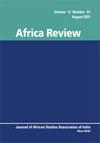Macroeconomic Policies and Foreign Capital Inflows in Nigeria
IF 0.5
Q4 AREA STUDIES
引用次数: 0
Abstract
The growth of manufacturing sector output in Nigeria is currently sluggish, if not stagnant, despite massive inflows of Foreign Direct Investment (FDI) as well as macroeconomic policies initiated by successive Nigerian governments. The study investigated how macroeconomic policies and FDI inflows have impacted on the manufacturing sector in Nigeria. The Augmented Dickey Fuller (ADF) unit root test was adopted to determine the stationary properties of the data, and the order of integration of the variables was tested using the Johansen cointegration test. The impact and interactions of macroeconomic policies on the manufacturing sector are less understood and shallow in the extant literature. The government’s macroeconomic policies encourage FDI in the communications and oil sector with a negative impact on the manufacturing sector. This is implicated in inadequate capital investments and technological diffusion. Nonetheless, the study shifts the paradigm in popular arguments that FDI is imperialistic, hence universally exploitative, to a new hypothesis that the failure of the manufacturing sector to tap into FDI and yield desirable growth output is linked to less viable globally competitive macroeconomic policy frameworks in Nigeria. The study therefore recommends that the Nigerian government should review its macroeconomic policies, particularly the monetary and exchange rate, and draw up proactive human capital development plans that can directly contribute to the development of the productive capacity of the country’s population.尼日利亚的宏观经济政策和外资流入
尽管大量外国直接投资(FDI)的流入以及历届尼日利亚政府发起的宏观经济政策,尼日利亚制造业产出的增长目前仍然缓慢,如果不是停滞不前的话。该研究调查了宏观经济政策和外国直接投资流入对尼日利亚制造业的影响。采用增广Dickey Fuller (ADF)单位根检验确定数据的平稳性,采用Johansen协整检验检验变量的积分阶数。在现有的文献中,宏观经济政策对制造业的影响和相互作用较少被理解和肤浅。政府的宏观经济政策鼓励外国直接投资进入通讯和石油部门,这对制造业产生了负面影响。这与资本投资不足和技术扩散有关。尽管如此,该研究将流行的FDI是帝国主义的、因此是普遍剥削的观点转变为一种新的假设,即制造业未能利用FDI并产生理想的增长产出,与尼日利亚缺乏全球竞争力的宏观经济政策框架有关。因此,该研究建议尼日利亚政府应审查其宏观经济政策,特别是货币和汇率政策,并制定积极主动的人力资本发展计划,这些计划可以直接促进该国人口生产能力的发展。
本文章由计算机程序翻译,如有差异,请以英文原文为准。
求助全文
约1分钟内获得全文
求助全文
来源期刊

Africa Review
AREA STUDIES-
CiteScore
1.80
自引率
12.50%
发文量
22
期刊介绍:
Africa Review is an interdisciplinary academic journal of the African Studies Association of India (ASA India) and focuses on theoretical, historical, literary and developmental enquiries related to African affairs. The central aim of the journal is to promote a scholarly understanding of developments and change in Africa, publishing both original scholarship on developments in individual countries as well as comparative analyses examining the wider region. The journal serves the full spectrum of social science disciplinary communities, including anthropology, archaeology, history, law, sociology, demography, development studies, economics, education, gender studies, industrial relations, literature, politics and urban studies.
 求助内容:
求助内容: 应助结果提醒方式:
应助结果提醒方式:


